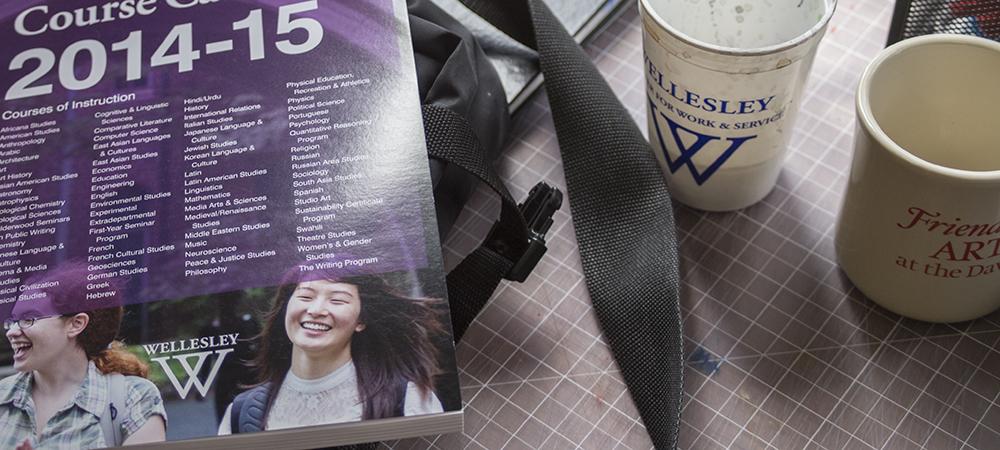Africana studies and sociology among several departments to offer new classes
For students who find choosing courses that fulfill graduation requirements another tedious chore, a new cluster of courses offered this academic year may be the answer to making course registration a more enjoyable experience.
Most classes that Wellesley students take to satisfy graduation requirements are either split between introductory courses designed for potential majors or less intense courses designed for non-majors.
The new courses offered this year are one way Wellesley College seeks to introduce students to new areas of study that are both challenging and engaging.
“It’s great that Wellesley is offering so many new courses. The more, the better. Students tend to be more interested in more interdisciplinary classes rather than something that is very concentrated,” said Inkyung Sul ’16.
Professor Layli Maparyan, executive director of the Wellesley Centers for Women, professor of Africana studies and author of “The Womanist Reader” as well as “The Womanist Idea,” is offering a new course this year, AFR 238: Womanism. The course explores womanism as a distinct perspective within the field of Africana studies.
“Womanism is women-centered, but gender-inclusive; it is Africana-centered, but ethnically and culturally inclusive. There’s just so much there that doesn’t show up anywhere else in academia, critical theory or social movement studies,” Maparyan said.
Maparyan mentioned that students will have the opportunity to examine the womanist social vision and apply this information to understand social and ecological problems. This course can be used to satisfy the social and behavioral analysis graduation requirement.
According to Merriam-Webster dictionary, womanism is “a form of feminism focused especially on the conditions and concerns of black women.”
“Students’ understandings of why culture matters will be strengthened beyond basic diversity discourse. Womanism is not ‘about’ women of color so much as it is ‘about’ women of color’s perspective on all that exists.” By studying about womanism, Maparyan said, “Wellesley students will be better informed and more effective as leaders if they know about womanism.”
Visiting Lecturer Rowena Xiaoqing He from Harvard’s Department of Government is teaching a sociology course, SOC 289, on the Tiananmen Square Movement of 1989. Dr. He, whose book “Tiananmen Exiles: Voices of the Struggle for Democracy in China” has received numerous positive reviews, was invited to give a lecture at the U.S. State Department this year on the impact of Tiananmen.
Offered at Wellesley on the 25th anniversary of the Tiananmen movement in China, students will explore the Tiananmen movement in detail and analyze the faction’s impact on Chinese society today. This course also satisfies the social and behavioral analysis requirement.
In the course, exiled student leaders and political prisoners from the 1989 movement will be invited to share their experiences with Wellesley students. Dr. He will also bring the class to the Tiananmen archive at the Harvard-Yenching Library where students will be able to see photographs, Chinese propaganda posters and touch clothes stained with blood from 1989.
“For me, Tiananmen is memory; for them, Tiananmen is history. This is why focusing on the movement’s long term impact is crucial — it is closely related to how the movement is presented, interpreted and remembered,” Dr. He said.
The course focuses not only on events that occurred in 1989 but also traces the intellectual, political, social and economic roots of the movement. Dr. He said that the importance of understanding Tiananmen cannot be overstated when trying to understand today’s China and its international relations.
“There are opposing narratives about 1989 because an official version of the events has been created and enforced by the Beijing government through campaigns on all fronts. [1989] epitomizes the relationship between history and memory, power and politics and intellectual freedom and human rights in the Chinese context,” she explained.
Dr. He said that the course first came to Wellesley from Harvard because she was impressed by Wellesley students’ curiosity and open-mindedness when she presented a paper on Tiananmen last fall. However, the course and the teaching methodology adopted will undergo changes to suit the classroom reality at Wellesley.
“We can never walk into the same classroom twice,” Dr. He said. “I’ve never taught the course the same way for any single class.”
Through the course, Dr. He plans to cultivate her students’ personal moral engagements and their intellectual understanding of the world because civic engagement should have an important place at institutions of higher education. She aims to shed light on to those who were silenced to help revitalize the memory of Tiananmen Square.
These courses are not the only new classes Wellesley has to offer this year. The political science department is offering a first-year-only course on the aftermath of 9/11 and its consequences on America (POL3 121), taught by Professor Paul MacDonald. Professor Michal Ben-Josef Hirsch of the political science department is also teaching a new comparative politics 300-level course on transitional justice (POL2 336).
The psychology department is offering a new course on Asian American psychology (PSYC 222). Taught by Professor Chen, the course discusses the cultural experiences of Asian Americans and the impact these experiences have on their mental health. PSYC 346, a seminar course also taught by Professor Chen, focuses on the interaction between culture and emotions.
As new courses are initiated, Wellesley will continue to develop these courses over the next few years based on student input and feedback. Though it is still early in the semester, Wellesley’s new courses have impacted students’ choices as they continue to shop for classes this week until the add period ends Monday at 11 p.m.
“The new courses will be successful if the professors and students are both passionate about the subject. It’s a good thing that we will continue to have new course options that we can enroll in the future,” Jennifer Mou ’18 said.
Photo courtesy of Wellesley College
Sabrina Leung ‘18 is the Digital Editor who is plans to major in International Relations-Political Science. She is best reached at sleung@wellesley.edu or @sabrinatzleung on Twitter.




